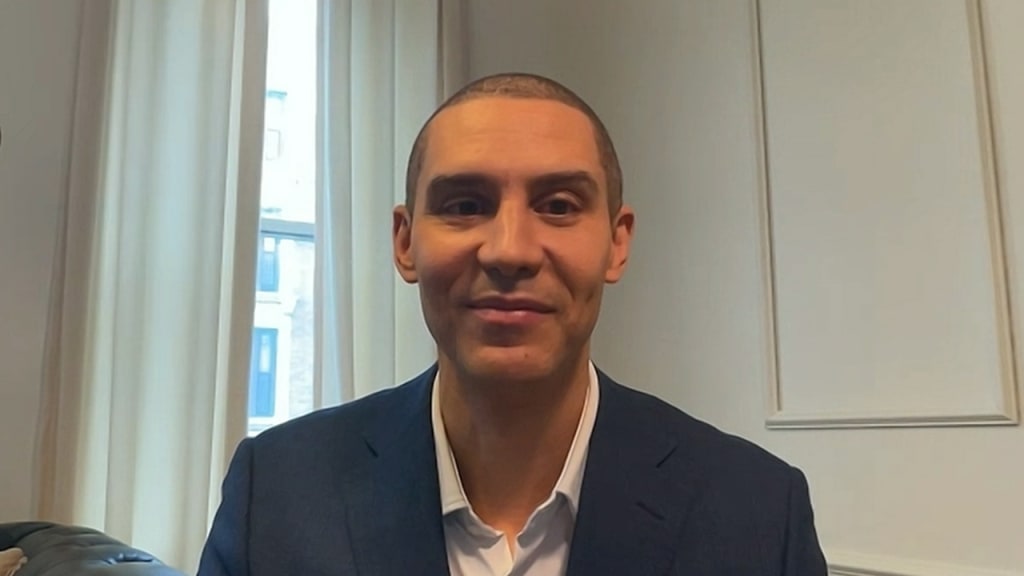The time the new White Sox broadcaster went undercover
This browser does not support the video element.
This story was excerpted from Scott Merkin's White Sox Beat newsletter. To read the full newsletter, click here. And <a href="https://www.mlb.com/fans/newsletters/beat-reporter?_gl=11cckjfj_gcl_auMzE4MTI0NzYwLjE3MDQwMjgzMjI." target="_blank">subscribe to get it regularly in your inbox.*
GLENDALE, Ariz. -- Every Major League Baseball broadcaster has a specific and unique origin story.
John Schriffen, who began work as the new White Sox television voice Friday during the 2024 Cactus League opener at the Cubs, has a background virtually unmatched. Actually, it’s a story within this origin story that really sets him apart.
Schriffen once was based in New York while working for ABC News, but he was assigned internationally. The coolest story he ever did, “like exotic exotic,” as he termed it, was when he went to Cordoba, Colombia, to cover illegal animals being trafficked. It happened to be the third most profitable illegal industry in Colombia behind drug and gun sales.
This undercover tale for "Nightline" involves Schriffen, zoologist Lucy Cooke and his crew purchasing sloths. But let’s allow Schriffen to set the stage before getting to that denouement.
“I had to cut out the button in my shirt and we had a little button camera,” Schriffen told MLB.com. “And we had a fixer who was with us who spoke Spanish and knew the lay of the land. We went into this very rural neighborhood.
“The way we knew we were getting close to the spot was when you drive on the side of the road, you’ll usually see someone stick their arm out with a bunch of birds attached to a long stick. That lets you know they have more animals.
“One time we pulled over to this person who had all these birds and then two other guys run out from behind this mound and pull out from their sack a red something monkey and another sloth and other exotic animals you would never see,” Schriffen said. “We passed on it, but we wanted to show how prevalent it was.”
Eventually they got to the buy spot the fixer/guide had for them, and the person they were supposedly going to buy from brought out a crate covered in a cloth. The cloth came off, and inside were three pale-throated sloths described by Schriffen as so tightly wound and scared that it looked like it was a big ball, one sloth.
“So we are talking to the person, and we are trying to get them to explain how they found them. We need to get enough information for a segment to understand what it takes to get a sloth, care for a sloth,” Schriffen said. “The problem was in the process of asking so many questions, the guy got suspicious. So he starts threatening the fixer.”
At that point, the fixer pulled them back to their van and said the guy selling the sloths was “getting really creeped” and “thinks we are somebody that we are not,” Schriffen said. Something bad was going to happen if they didn’t get the sloths and get out.
Here was the problem: They had direct orders from their bosses to not participate in illegal trade.
“We had to call our bosses from Colombia back to New York headquarters and get an emergency, ‘Hey, our safety is at danger, can we get the OK to buy this,’” Schriffen said. “They were like, ‘Yeah, yeah. Do whatever you need to be safe.’”
After buying the sloths and putting them back into the crate and into the van, the story ended with the animals being taken to a big forest and having them creep away to safety. They were healthy enough to survive on their own.
“People don’t realize sloths are the worst pets possible because they are very hard to take care of and they die, and that’s why it’s illegal,” Schriffen said. “They don’t want people taking them in as pets. They don’t last. They just die.”
Broadcasting an extra-inning game seems a bit more sedate but just as exciting for Schriffen, who has been around the team this past week getting ready for game No. 1.
